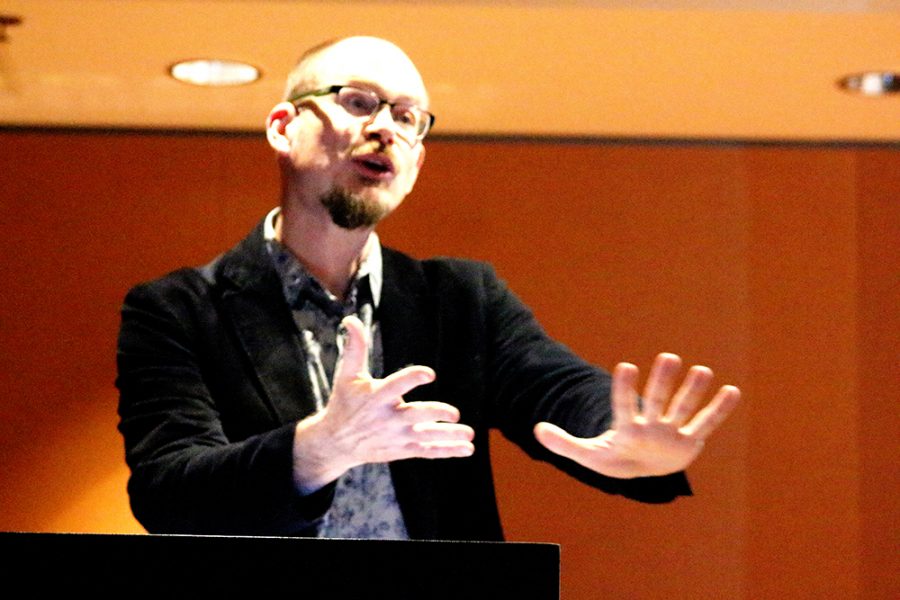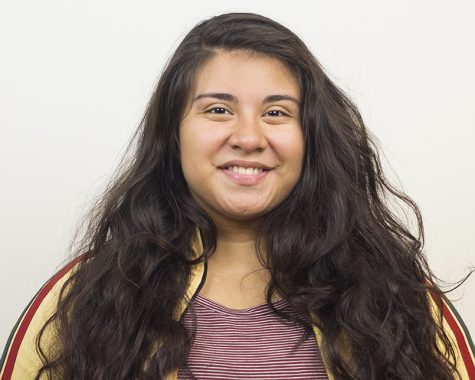Ted Underwood talks understanding of literary history
Celine Crow | The Daily Eastern News Guest speaker Ted Underwood gives a presentation on how well we understand literary history on Wednesday night in the Doudna lecture hall.
October 5, 2016
Ted Underwood presented the question, “how well do we already understand literary history?” to an audience of faculty and graduate and undergraduate students Wednesday in the Doudna Fine Arts Center Lecture Hall.
Eastern’s English department, in partnership with the Center for the Humanities, presented the annual Susan Bazargan Graduate Lecture in English and the Lynch Humanities Speaker Series.
C.C. Wharram, English professor and director of the Center for the Humanities, introduced Underwood, thanking him for speaking at Eastern and commending him on his work in the digital literary field.
Wharram called Underwood a “computational monster” admiring Underwood’s ambition within his field, and his contribution to digital humanities.
Wharram also said that Underwood’s work has changed his own perspective on literary history and how he looks at the different periods of literature. He compared the way many scholars read literary history to a competitive field saying it was “like a literary fight club.”
Afterward, Underwood presented his lecture through a PowerPoint presentation with a series of questions that led his discussion.
He focused on how he used digital library analyses to figure things such as how quickly time passes in fiction, representation of gender in fiction, and how using statistical data can change the way literature is studied and analyzed.
In one of his examples, he explained how he used digital library analyses to figure out how quickly time passes in fiction.
He and two other colleagues each studied 16 pieces of literature and evaluated 250 words out of each individual piece.
From there, they recorded how fast different eras of literature passed time from 15 minutes to 24 hours within 250 words of text.
Underwood said the data showed a gradual change from time progressing faster to time progressing slower in 250 words through the eras of literature.
He explained that modern literature had possibly become more action-based, detailing individual scenes rather than summaries of time.
He then opened the discussion for the audience to ask him questions.
During the question-and-answer portion, Underwood stressed that he did not want to “sell (his presentation) as a massive change.”
Instead, he hoped that his studies would simply help people consider the various ways to look at literature and the use of technology and digital libraries to study the different periods.
“I think people are afraid,” Underwood said. “Technology has become such a big part of our lives, and I think it scares people.”
He said he hopes to see these sort of statistics become a part of the English curriculum, but also said he knows that it will evolve very slowly.
Angelica Cataldo can be reached at 581-2812 or amcataldo@eiu.edu.




![[Thumbnail] Eastern's Old Main was quiet Thursday morning while educators who had left the office to strike picketed outside.](https://www.dailyeasternnews.com/wp-content/uploads/2025/04/Strike_01_LT_O-800x1200.jpg)










![[Thumbnail Edition] Senior Foward Macy McGlone, getsw the ball and gets the point during the first half of the game aginst Western Illinois University,, Eastern Illinois University Lost to Western Illinois University Thursday March 6 20205, 78-75 EIU lost making it the end of their season](https://www.dailyeasternnews.com/wp-content/uploads/2025/03/WBB_OVC_03_O-1-e1743361637111-1200x614.jpg)














![[thumbnail edition] Assistant Coach of the Linebackers, Rodman Noel talking to the linebackers about their positions at O'Brien Field on the Eastern Illinois University campus, Charleston Ill.](https://www.dailyeasternnews.com/wp-content/uploads/2025/04/FB_24_O-1-e1744671213207-1200x609.jpg)









































